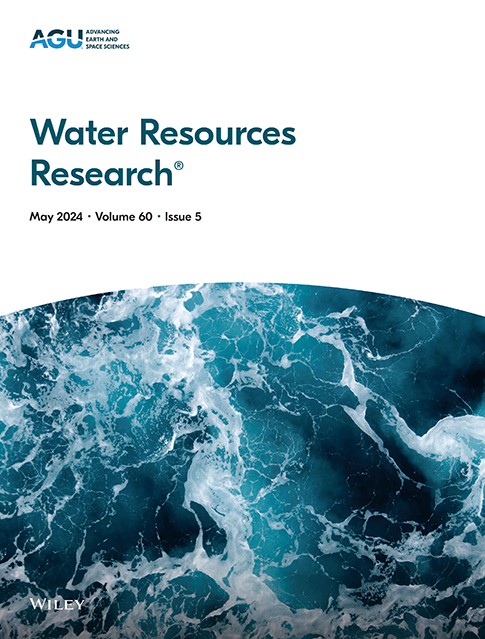Estimation of Extreme Floods Using a Statistical and Conceptual Model of the Hydrological Response
IF 4.6
1区 地球科学
Q2 ENVIRONMENTAL SCIENCES
引用次数: 0
Abstract
The robust estimation of flood peak discharge values is critical for designing mitigation measures and increasing preparedness to natural hazards. Traditional flood estimation methods are, however, severely limited by data series shorter than the return period of interest, as they only use annual maxima or a few values above a high threshold. Here we couple two recent advances in flood estimation from short data samples, namely the Metastatistical Extreme Value Distribution (MEVD) and a conceptual model of flood generation processes, the Physically based Extreme Value (PhEV) distribution of river flows. The result is a methodology, defined through a few hydrologic attributes describing runoff generation and catchment response, to estimate extreme discharge in poorly gauged basins, which we test on data from 178 catchments in Germany. We find that extremes are best estimated when PhEV runoff-generation parameters are set using the long-term mean discharge and precipitation depth, while catchment response parameters are estimated by statistical fitting to observed peak streamflow values. This estimation method interestingly outperforms a methodology in which all parameters are tuned to optimize the reproduction of the statistics of observed peak streamflow values. Our results show that the median relative error associated with MEVD-PhEV, across the large data set explored, consistently remains between −50% and +50%. Hence, MEVD-PhEV yields useful estimates of extreme flows with limited observational information and with no need of preselecting a suitable distribution for ordinary peak discharge values, a step that is substituted by the inclusion of catchment hydrologic information.利用水文响应的统计和概念模型估计极端洪水
对洪峰流量值的可靠估计对于设计缓解措施和加强对自然灾害的准备至关重要。然而,传统的洪水估算方法由于仅使用年最大值或高于高阈值的少数值,受到比兴趣回归期短的数据序列的严重限制。本文将基于短数据样本的洪水估计的两个最新进展结合起来,即亚稳态极值分布(MEVD)和洪水产生过程的概念模型,即河流流量的物理基础极值分布(PhEV)。结果是一种方法,通过描述径流产生和集水区响应的几个水文属性来定义,用于估计测量不佳的流域的极端流量,我们对来自德国178个集水区的数据进行了测试。研究发现,利用长期平均流量和降水深度设置插电式混合动力产流参数时,极值估计效果最好,而集水区响应参数则通过统计拟合来估计观测到的峰值流量值。有趣的是,这种估计方法优于一种方法,在这种方法中,所有参数都被调优,以优化观测到的峰值流流量值的统计再现。我们的研究结果表明,在探索的大型数据集中,与MEVD-PhEV相关的中位数相对误差始终保持在- 50%到+50%之间。因此,MEVD-PhEV在有限的观测信息下产生了对极端流量的有用估计,并且不需要预先选择普通峰值流量值的合适分布,这一步骤被包含流域水文信息所取代。
本文章由计算机程序翻译,如有差异,请以英文原文为准。
求助全文
约1分钟内获得全文
求助全文
来源期刊

Water Resources Research
环境科学-湖沼学
CiteScore
8.80
自引率
13.00%
发文量
599
审稿时长
3.5 months
期刊介绍:
Water Resources Research (WRR) is an interdisciplinary journal that focuses on hydrology and water resources. It publishes original research in the natural and social sciences of water. It emphasizes the role of water in the Earth system, including physical, chemical, biological, and ecological processes in water resources research and management, including social, policy, and public health implications. It encompasses observational, experimental, theoretical, analytical, numerical, and data-driven approaches that advance the science of water and its management. Submissions are evaluated for their novelty, accuracy, significance, and broader implications of the findings.
 求助内容:
求助内容: 应助结果提醒方式:
应助结果提醒方式:


